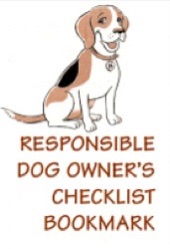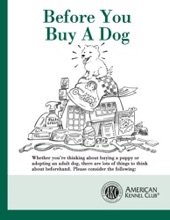
Responsible Dog Ownership
Owning a dog is not just a privilege-it's a responsibility. These animals depend on us for, at minimum, food and shelter, and deserve much more. If you are considering taking a dog into your life, you need to think seriously about the commitment that dog ownership entails. If you already have a dog, are you fulfilling all your obligations as its owner?
Recognize the Commitment
Dog ownership is not something to be entered into lightly. Owning a dog is a long-term emotional and financial commitment. Before deciding that a certain dog is right for you, you must make an honest assessment as to whether your home is right for any dog.
Evaluate Your Lifestyle
If you get a dog, he (or she) will become a part of your life. You need to make sure that he's suited for your lifestyle. For example, if you are athletic, you will probably not be happy with a dog that has a low energy level. If you are extremely neat, you will probably want a dog that doesn't shed much. All aspects of your family's life - hobbies, activities, personalities, schedules - should be evaluated before you get a dog.
Based on your evaluation, determine what qualities you want in a dog. Consider size, energy level, grooming needs, trainability and temperament. Do you want a guard dog or a lap dog? Is it important that your dog get along with children? If you rent your home, are there restrictions on height, weight or breed? Answer these questions now - once you bring a dog home, it can be heartbreaking to realize that you made the wrong choice.
Choose a Breed
Once you have made your list of ideal characteristics, do some research to find which breeds fit that profile.
Get a Referral
You have a much better chance of being satisfied if you get your dog from a responsible, ethical breeder whose primary concern is to produce dogs of high quality, good health and stable temperament. BRKC can help refer you to breeders or rescue organizations in our area.
Ask the breeder any questions you can think of about the breed. When you find a breeder you're comfortable with, ask to visit the kennel and view the dogs on the breeder's premises. Inquire about health problems of the breed, and what can be done to prevent or control them. Find out what kinds of activities, including competition, the breeder's dogs participate in and enjoy. The breeder's dogs are a preview of what your dog will be.
Consider an Older Dog
Puppies aren't for everyone. If an older dog better fits your lifestyle, check the AKC website for breed rescue groups. These organizations rescue purebred dogs that have been lost, abandoned or surrendered due to the death or illness of their owners. Most rescue dogs have been spayed or neutered and are screened for health and temperament problems. Rescue is a not only a great source for purebred dogs, it's also a way to save the life of a dog in need.
Expect Questions
A responsible breeder or rescue contact will ask you extensive questions about the type of home you can offer a dog. These people are as committed as you are to making the right match between you and a dog. Give honest answers to their questions. Remember that, due to their experience in the breed, they know what issues are important in placing one of their dogs.
Prepare to Wait
Availability varies. Be aware that a puppy or dog of the breed you've decided on may not be easy to find. Responsible breeders do not breed often, and many times the puppies of a planned breeding are already spoken for. Just remember that a good dog is worth waiting for.
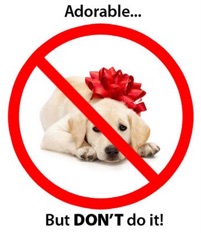
Skip the Holidays
Many people try to buy puppies as Christmas gifts for children or other family members. Most breeders do not recommend this. You should be prepared to give a new puppy your undivided attention, and that is rarely possible during the busy holiday season. A better idea is to give dog-related gifts - toys, leashes, grooming tools - and then bring your puppy home when all the excitement has died down.
Get It in Writing
Information about the sale or adoption should be in writing. The contract should include, for example, details regarding any fees, spay-neuter agreements, health guarantees, terms of co-ownership, restrictions on breeding, and living arrangements. It should also include instructions on what to do if the dog, despite your best efforts, simply doesn't work out for you or your family. Most responsible breeders will insist that the dog be returned to them.
Make a Schedule
You and your family members should decide who will be responsible for food, water, walking, exercise, clean-up and grooming. Post a schedule of tasks in a visible area of the house to remind everyone of their responsibilities.
Dog-Proof Your Home
Prepare your home before your new dog arrives. Move breakables or "chewables" to higher ground. Make electrical cords inaccessible to curious paws and noses. Block off any area of the house that you want off-limits to the dog. Put the lid down on your toilet and your shoes up in your closet. Block access to any house or garden plants that may be toxic to dogs.
It is against the ethics of responsible breeders to sell to pet stores. Buyer’s should always seek a dedicated hobby breeder, visit the home/kennel, and receive guarantees on health and temperament. Contact BRKC for a breeder recommendation.
Don’t Raffle or Auction off Companion Animals
Raffling or auctioning companion animals is never in the best interest of the animal. All AKC parent clubs have include in their Code of Ethics that member breeders will not allow their pups to be auctioned or raffled. There are many reasons, some of which are outlined on this site. For more, please visit http://omalmalamutes.com/omal/raffle.htm
Set a Containment Policy
It is essential that you have a secure method of keeping your dog on your property. Check your fence for spots vulnerable to chewing or digging. If your yard is not fenced, consider a large dog run or invisible fencing. If your property is not fenced in some way, stress to family members that the dog must be leashed at all times when taken outdoors.
Get a Collar
Your dog should wear a flat leather or nylon collar with a buckle at all times, except when in a crate. (The buckle can catch on the crate and cause injury.) The collar should be tight enough that it will not slide over the dog's ears, but loose enough that you can fit two fingers between the collar and the dog's neck. Check the fit of the collar often, especially if you have a fast-growing puppy.
Make a Bed
Every dog needs a quiet place to call his own. Create a comfortable area, whether a crate, a mat or a pile of blankets, for your dog to go to when he needs rest or privacy.
Buy Some Toys
Provide your dog with a variety of toys to prevent him from playing with your socks and shoes, your morning paper, or your child's favorite doll. Get some toys that you and your dog can play with together, such as balls and plush toys, and some things to keep him busy when he's alone, such as chewies or rope bones. Never leave your dog unattended with any toy that has small, detachable parts.
You should choose a veterinarian for your dog as soon as possible. Have your dog examined by the vet within a few days of his arrival. Give your vet copies of the dog's health records, and set-up a vaccination and check-up schedule. Click here to Find a veterinarian in Louisiana.
Make Introductions
Introduce your dog to your household slowly. Many pairs of hands petting him at once will only frighten him. Later, introduce him to neighbors, regular visitors and other family members. Give your dog a sense of who your - and your dog's - friends are.
Introduce Other Pets
Other companion animals in your home should also be properly introduced to your new dog or puppy. Don't expect them to get along right away, and don't try to force them to play together. Give them time to adjust to one another.
Housetrain
Whichever method of housetraining you have chosen - crate training, paper training or litter box - make sure that all members of the family enforce it consistently. Accidents happen, so have a procedure for clean-up.
Set House Rules
Teach your dog from the beginning what is and is not appropriate behavior. If something is "OK" today, your puppy will think it's OK forever. Make sure that every member of the family enforces the house rules. Consistency is the key to having a well-behaved pet.
Feed a Good Diet
Work with your veterinarian or breeder to find the food that is best for your dog's age, size and activity level. Keep the diet consistent. Always provide plenty of fresh, clean water.
Exercise
Dogs need regular exercise to ensure continuing good health. Take your dog for walks, run around in the yard, throw a ball around - anything to get him up and moving. This will benefit his health and could prevent behavior problems.
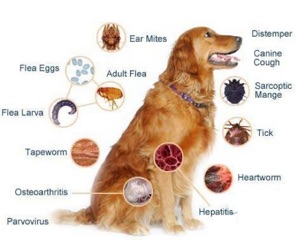
Dogs should follow a strict schedule of vaccinations to prevent diseases. Keep your dog current on his vaccinations, following the schedule recommended by your veterinarian. Keep a copy of your dog's vaccination records handy.
Prevent Disease
You can take steps to prevent other diseases not covered by the regular series of vaccinations. Depending on the area of the country you live in, your dog could be at risk for diseases such as heartworm and Lyme disease. Ask your veterinarian for advice on prevention.
Repel Fleas and Ticks
Aside from discomfort, parasites such as fleas and ticks can cause serious diseases. Keep your dog, his bedding, and your home free from parasites by using the method recommended by your veterinarian.
Groom Your Dog
All dogs should be groomed regularly for health and best appearance. Some short-coated breeds need just a quick brushing every week, while some longer-coated breeds need daily brushing to prevent matting and to reduce shedding. If your dog requires clipping or sculpting, you may want to consult a professional groomer.
Clip Those Nails
Keeping your dog's nails short will keep him comfortable, prevent injury to his feet, and may save the surface of your floors. If you can hear your dog's nails click on a hard surface, they need to be trimmed. Ask your veterinarian for advice on clipping your dog's nails yourself.
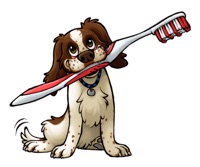
To prevent tooth decay and gum disease, clean your dog's teeth regularly. Most dogs will accept a "toothbrush" if introduced to it slowly and gently. You can also give your dog products such as hard biscuits, rope bones and nylon chews to keep his teeth clean.
Prevent Obesity
Keep your dog healthy by maintaining him at an appropriate weight. Feed him a well-balanced diet and give him plenty of exercise. Don't give in to begging - "people food" is generally bad for dogs.
Know Your Breed's Health Risks
You should be aware of common health problems in your breed, how to prevent them, and how to recognize their onset. For example, some giant breeds are prone to bloat, while some short-faced breeds are prone to respiratory problems. Ask your breeder or veterinarian for information about any signs or symptoms you should watch for in your pet.
Protect From Poisons
Make sure that your home and yard are free from poisonous substances, such as antifreeze, which tastes good but can cause serious illness or even death. Keep your veterinarian's number handy in case of accidental ingestion.
End Suffering
If, due to illness or old age, your dog reaches a point where his quality of life is severely compromised, arrange to end his life humanely. Letting go is sometimes the kindest thing you can do. Don't prolong the suffering because you fear the pain of losing your dog.
Microchips and tattoos are methods of permanently identifying your dog, and can be invaluable in recovering your dog should he become lost. You may wish to enroll your dog in AKC's affiliate, the AKC Reunite service, which is the nation's largest database of microchipped pets.
Provide Shelter
Your dog needs a sheltered area for the time he spends outside. The shelter should provide shade in summer and warmth in winter.
Travel Safely
Keep your dog safe in the car by using a crate, or by attaching the dog to a seat belt with a harness. Never let your dog ride free in the back of a pickup truck, or allow him to hang his head out of the car window.
Dogs can succumb to heat stress in a matter of minutes. Do not leave your dog in the car when the temperature is high. When your dog is outside, he should have a shady place to lay down and plenty of fresh, cool water.
Prepare for Disaster
Be prepared to care for your dog in the event of a disaster such as fire, flood, hurricane or earthquake. Visit ReadyDog for information and tips relevant to East Baton Rouge.
Establish an Emergency Contact
Enlist a family member or friend to take care of your dog in the event of a sudden illness, hospitalization or other emergency. This person should ideally be someone your dog has spent some time with and is comfortable with. Leave a list of general care instructions in a safe place.
Make a Will
You should make arrangements for the safety and care of your pet in the event of your death. Don't assume that a family member will step in to take care of the dog.
Be The Alpha
Dogs need to know who's boss - and that boss should be you. You and your dog will be much happier together if you establish yourself as the leader of the pack.
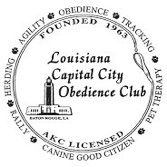
Teach your dog basic commands such as sit, stay, come and down. Training your dog will not only make your life easier, but will also fulfill your dog's desire to learn and please you. Obedience classes can be a great experience for you and your dog. You may even discover that your dog has a great talent for learning, and be able to compete in obedience, agility or tracking events. Louisiana Capital City Obedience Club (LCCOC) is an excellent resource for classes from puppy to advanced.
Socialize Your Dog
Expose your dog to different people and settings regularly. Take him to the park, to the pet store, on a walk through town. Praise him for accepting petting from friendly strangers, and for behaving calmly around other dogs. The more your dog learns of the world, the more comfortable he will be in it.
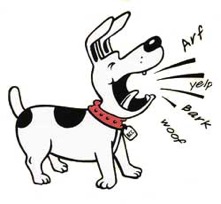
Don't let your dog's incessant barking annoy your neighbors. Teach your dog not to bark without real provocation. If your dog's barking is causing problems while you're away from home, try a silencing collar.
Supervise Play With Children
Children and dogs can be great companions, but they also require supervision when playing together. Your dog may be "good with kids," but what if he encounters a kid that is not good with dogs? Very small children should never be left alone with a dog, no matter how stable his temperament.
Breed Responsibly
Breeding should only be done for the advancement of the breed. If you are thinking about breeding your dog, consult your breeder for advice. Consider all the consequences-and expenses-of breeding a litter before you do so. Consult AKC publications for more information as well.
Spay or Neuter
Perform Genetic Screening
If you plan to breed your dog, it is very important to test for health and disease. Perform all available tests to rule out the possibility of passing on a genetic defect.
Set a Good Example
As a dog owner, you are responsible not only for your own dog's well being, but for the status of dogs everywhere. One irresponsible dog owner in town can make life difficult for dog owners all over. Owning a friendly, clean, well-mannered dog reflects positively on the species and may help protect our rights to own companion animals.
Respect Your Neighbors
Not everyone will love your dog as much as you do. Keep your dog on your property. Don't force your dog's company on a neighbor who isn't comfortable with dogs.

Always carry a plastic "baggy" or two with you when you walk your dog to pick up any waste it leaves behind, then dispose of the waste properly. Failure to clean up after your dog is disrespectful to your neighbors.
Respect Local Laws
Heed the laws regarding dog ownership in your city or county. These may include registration, leash laws and nuisance barking laws. Failure to obey the laws in your area may not only result in the loss of your dogs, but may also infringe upon the rights of others in your area.
Fight Anti-Dog Legislation
Be aware of any legislation developing in your city or state that may compromise the rights of responsible dog owners. Become an active voice against legislation directed against specific breeds. For more information, contact the Canine Legislation and Public Education departments at the AKC.
Your dog can become an American Kennel Club Canine Good Citizen by passing a test designed to demonstrate good manners and acceptable behavior in everyday situations. The CGC program has become a standard for recognizing obedient dogs and responsible dog owners throughout the country.

Email | P.O. Box 4033, Baton Rouge, LA 70821-4033 | © Baton Rouge Kennel Club | Site by Veni Harlan Creative

